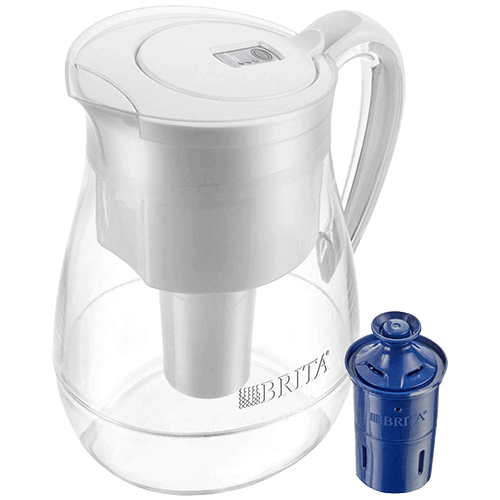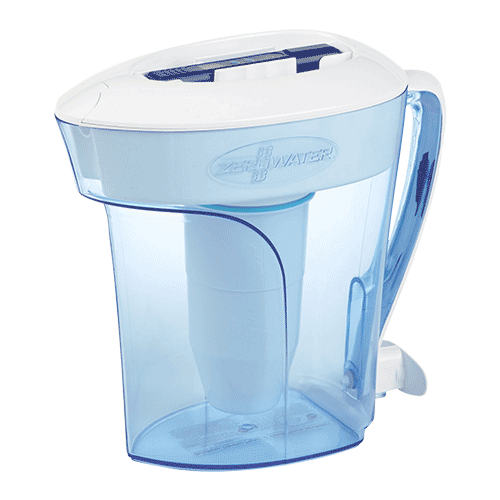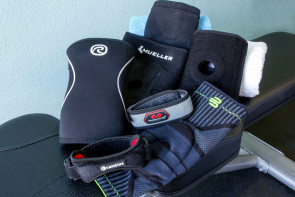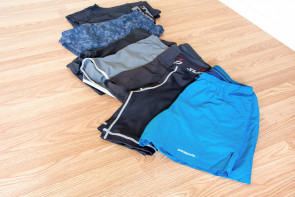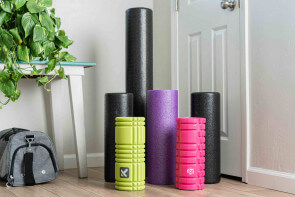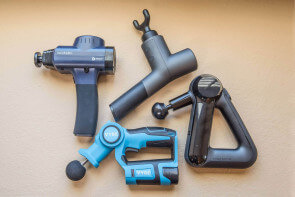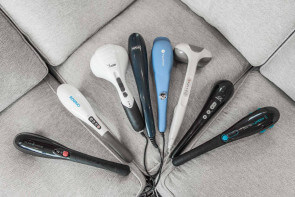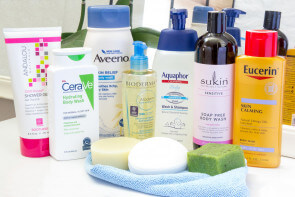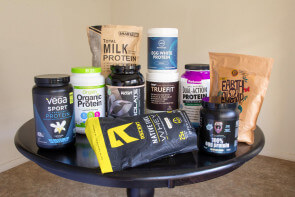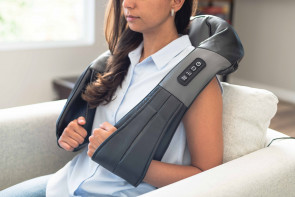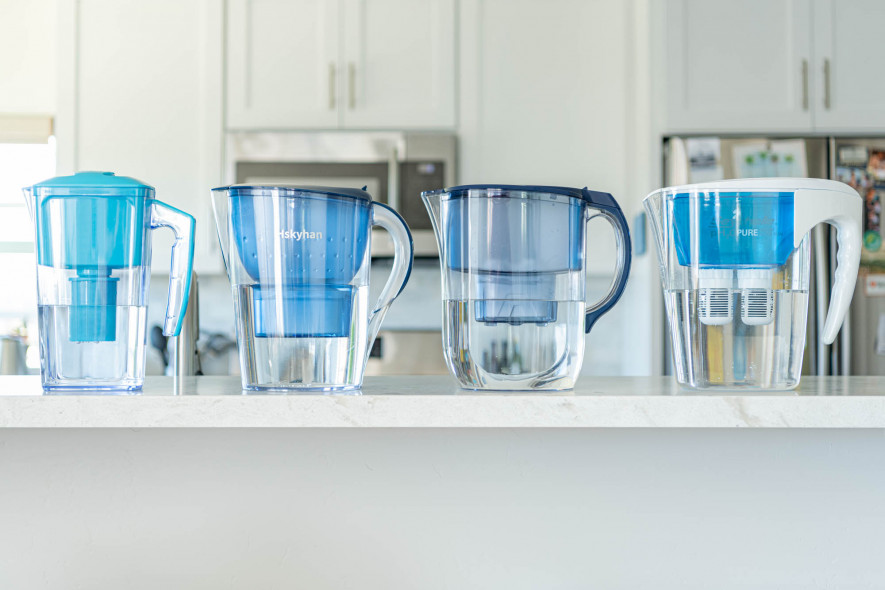
The Best Alkaline Water Filter Pitchers
After testing best-selling pitchers and talking to experts, we’ve confirmed that alkaline water filters are a waste of your money. If you want better-tasting water or have concerns about lead, check out the Brita and ZeroWater pitchers we tested in our review of the best water filter pitchers. If you want an antacid, you can easily get calcium carbonate, sodium bicarbonate or magnesium hydroxide tablets at most pharmacies, groceries and convenience stores.
We don’t recommend any of the alkaline-mineral-adding water filters for the benefits that manufacturers are advertising, since the hype about alkaline water is misleading at best. If you still want to add a mystery mix of minerals to your water to get a different flavor, the EHM – Ultra II is the best alkaline water pitcher we tested, since it gives you control over the flow rate of the filter so you can dial in how much it adds to your water.
Update: During the 2020 COVID-19 pandemic, retail availability of many products has become limited or restricted. The 5-cup Brita – Soho with Longlast filter is the water pitcher with our favorite filter that’s currently most available. Check for availability at Wal-Mart and Target.
Table of contents
- EHM – Ultra II (not recommended)
- Other finalists we tested
- Are there alkaline water benefits?
- How we selected finalists to test
- Important features to consider
- Alkaline vs. conventional filters
- How we tested
- The bottom line
EHM – Ultra II (not recommended)
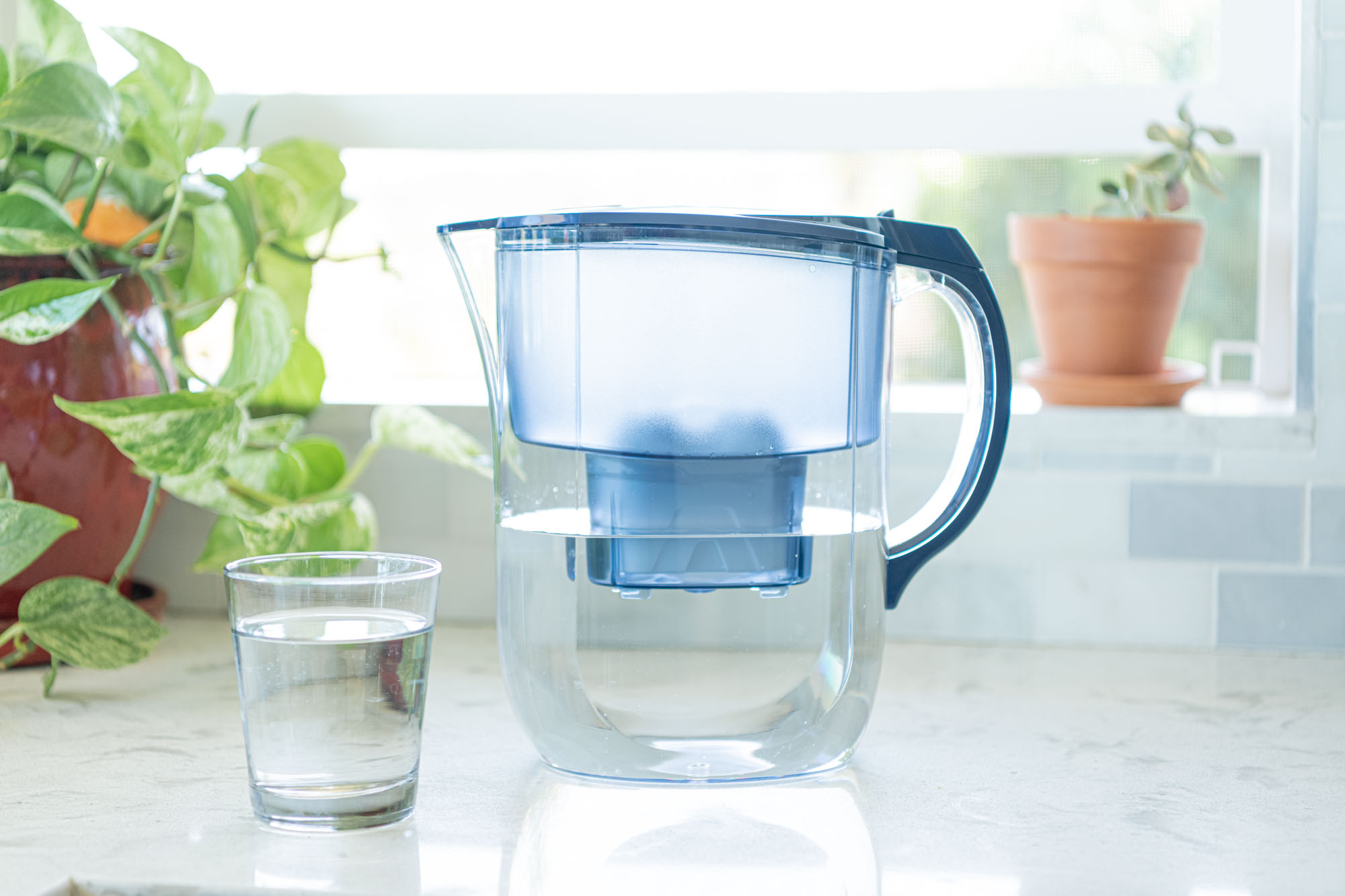
We don’t recommend alkaline water. Not from a cheap filter pitcher, not from an expensive machine, and certainly not from a bottle that costs triple what regular bottled spring water costs. Alkaline water is in almost every way just a marketing ploy, and the only benefit we can find is that some prefer the taste of it.
If you’re really convinced that you want to add minerals to your water this way, the best alkaline water filter is the EHM – Ultra II, since it at least gives you control over the rate of water flowing through the filter, which adjusts how much it changes.
EHM doesn’t tell us exactly what’s inside these filters, and that’s the biggest problem. Dr Tanis Fenton is a Canadian nutritionist who has studied alkaline water, and she says the health claims from manufacturers are a trick at best. See our interview below for more info on the science behind alkaline water.
There are actually some risks that come along with using filters like the EHM. Dr Fenton warns: “Since we don’t know what they are adding to the water or what method they are using to change the pH, we can’t evaluate it.” In contrast, bottled mineral water often includes a comprehensive assay of the minerals included.
One of the Amazon listings for the EHM filter cartridges claims the use of “maifan stone,” a naturally occurring mineral-rich rock formation that can contain everything from magnesium to iron to trace amounts of lead. A 2011 research paper often cited as proof that maifan stone is an effective filter media for removing lead was retracted by the publisher. There’s no reason for us to think using this filter is any more dangerous than drinking well water, but there’s little indication EHM even knows exactly what their filters take out or put back in.
The EHM is, to be fair, a well-designed pitcher, with a flip-up filling hole cover to keep out dust and a sealed reservoir that doesn’t leak unfiltered water (or fall out) the way some pitcher reservoirs do. This pitcher has a hole molded into the lid that looks like it was designed to work with an electronic timer to indicate filter life like premium Brita and PUR pitchers have, but it’s just covered with a sticker.
The one case where this pitcher makes sense is if the following all apply:
- You don’t like the taste of the chlorine or other treatments added to your tap water
- You’re not worried about filtering out any other compounds specifically
- Your local tap water source has low mineral content
- You specifically prefer the taste that extra minerals add to water
- You don’t worry about trace amounts of poisonous minerals that may be included in these filters by accident
With a filter cost of around 25 cents per gallon of filtered water, this is definitely cheaper than buying bottled mineral water.
Key takeaways:
- Alkaline water is a scam, don’t buy this for health reasons.
- The EHM – Ultra II adds minerals — supposedly including calcium, magnesium and potassium — at a rate you can control.
- If you like the taste of mineral water, you might prefer this to a standard filter.
- Don’t count on this filter to remove anything harmful.
Other finalists we tested
We tested three other pitchers with alkaline-mineral-adding filters, and they weren’t much different than the EHM. They all change the pH of water the same way, using mineral clumps or beads mixed in with the other.
Hskyhan (not recommended)
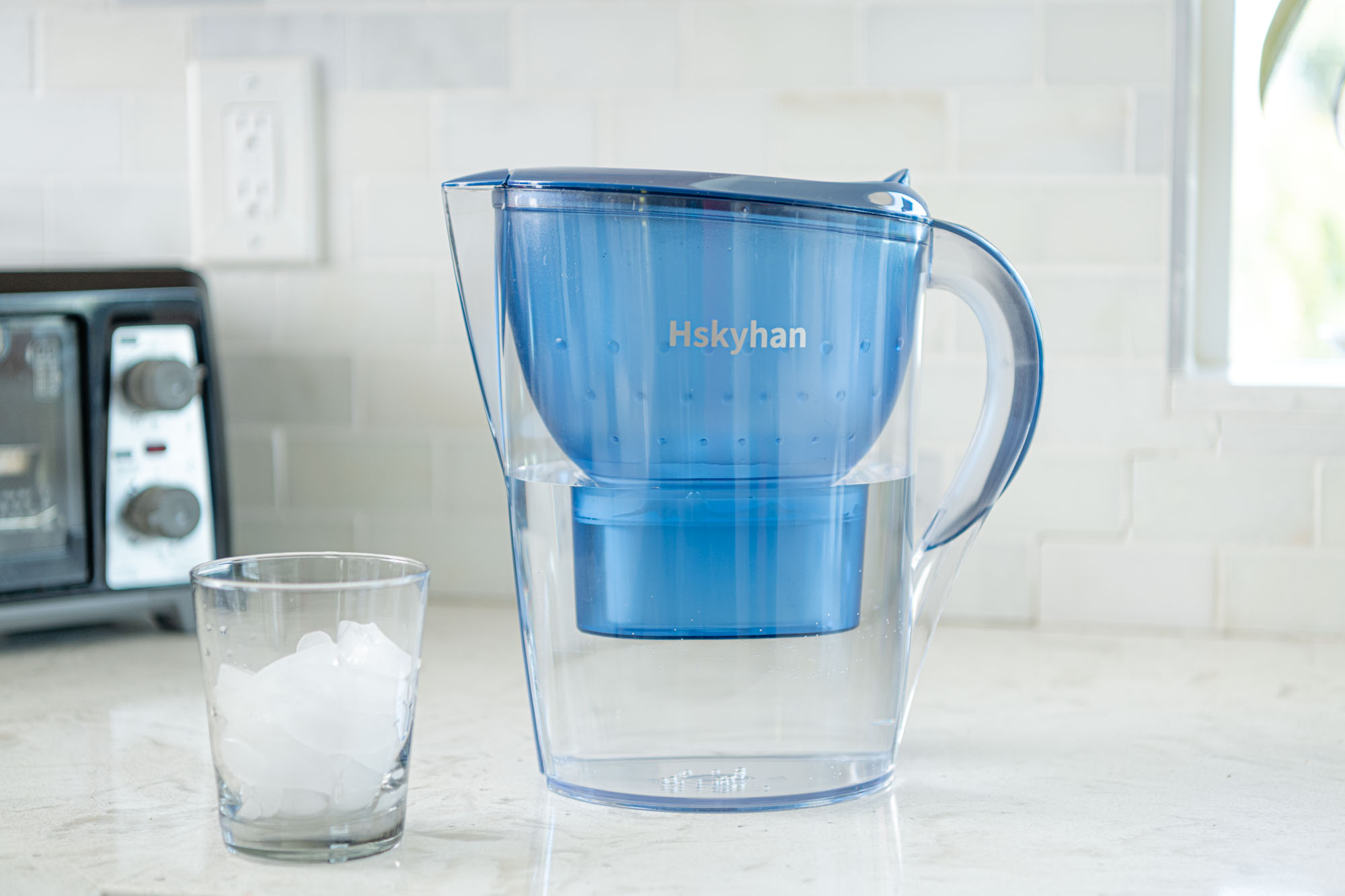
The Hskyhan – Alkaline Water Filter Pitcher is like the EHM, but it lacks some of the refinements like variable flow rate. The replacement filters cost about double what the EHM filters do, almost as much as a premium PUR or ZeroWater cartridge. Aside from the awkward name, this pitcher is one of the better designs overall. If this pitcher had NSF-certified lead-removing filters, it would be worth looking into, but the filter design it ships with is just a scam.
Seychelle – pH2O Pure (not recommended)
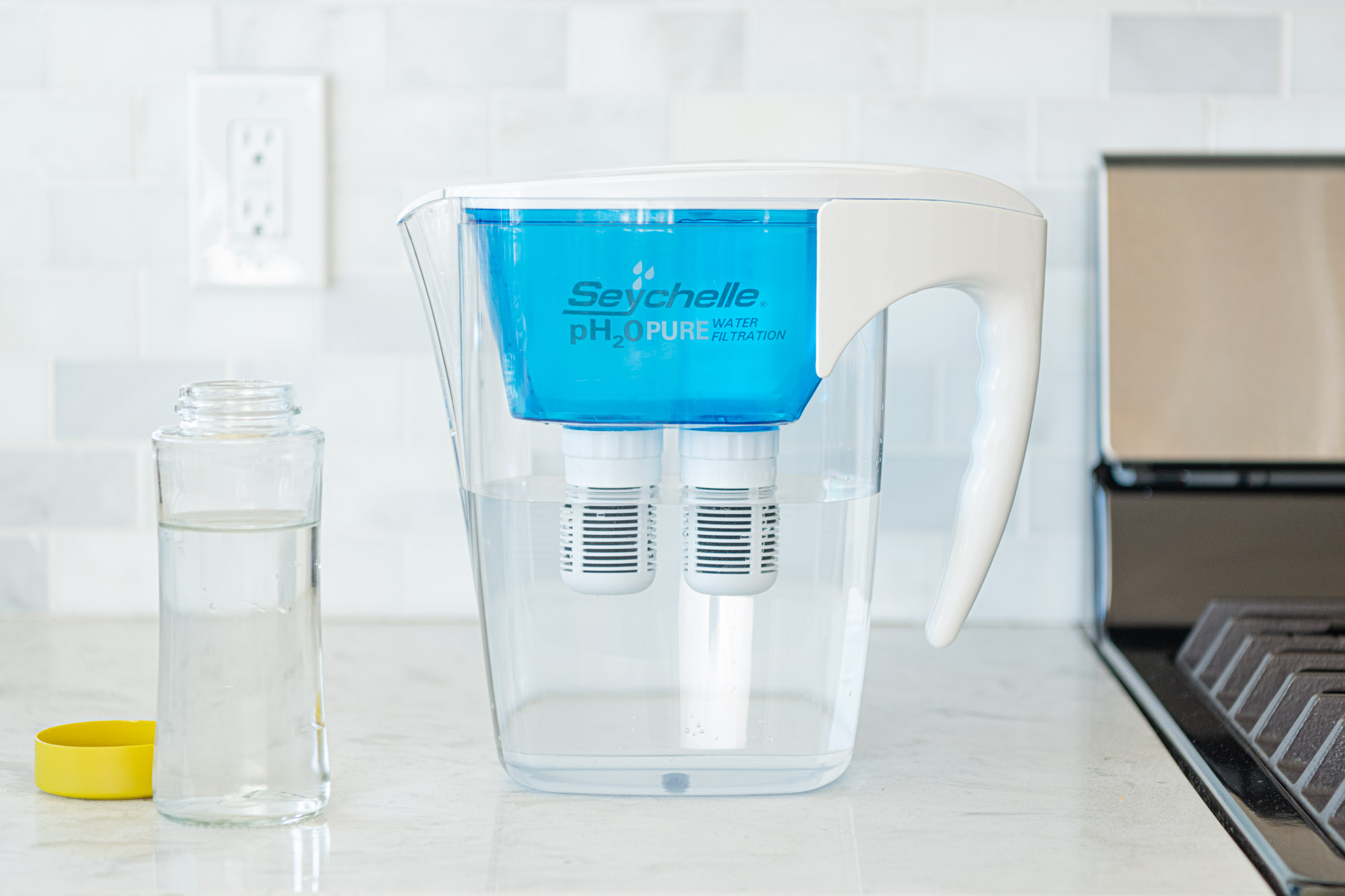
The pH2O Pure water filter from Seychelle Environmental Technologies is the pitcher we’re most ambivalent about. This pitcher uses a more advanced filter design than the others. It should, if the claims are true, be competitive with the best filters from Brita and PUR. Seychelle shows copies of test results in marketing materials, but these aren’t independently verified and they don’t even list the model number of the filter that was tested. The fact that the test shows a “99.00% reduction in total suspended solids” almost definitely means the test was for a different filter than this one, since our test and tests we’ve seen in customer reviews show that dissolved solids are the same or higher.
The fact that tipped the scales against Seychelle is the other promotional material. While the marketing claims on their Amazon listing and webpage were no less worrisome than any other alkaline water purveyor, a pamphlet included with the pitcher features a long list of decades-old, thoroughly debunked claims about water quality and the purported importance of “healthy” alkaline water. Worse, they include a testimonial from a former NASA engineer, who claims that he is “living proof” that Seychelle’s “pH water filtration system will reduce the illness such as cancer as well as other conditions.[sic]”
The Seychelle filter is supposed to remove fluoride, but in our test with 4 parts per million of fluoride in the challenge solution (about four times the amount you’d expect to see in city water), the reduction was only 75%.
OXA (not recommended)
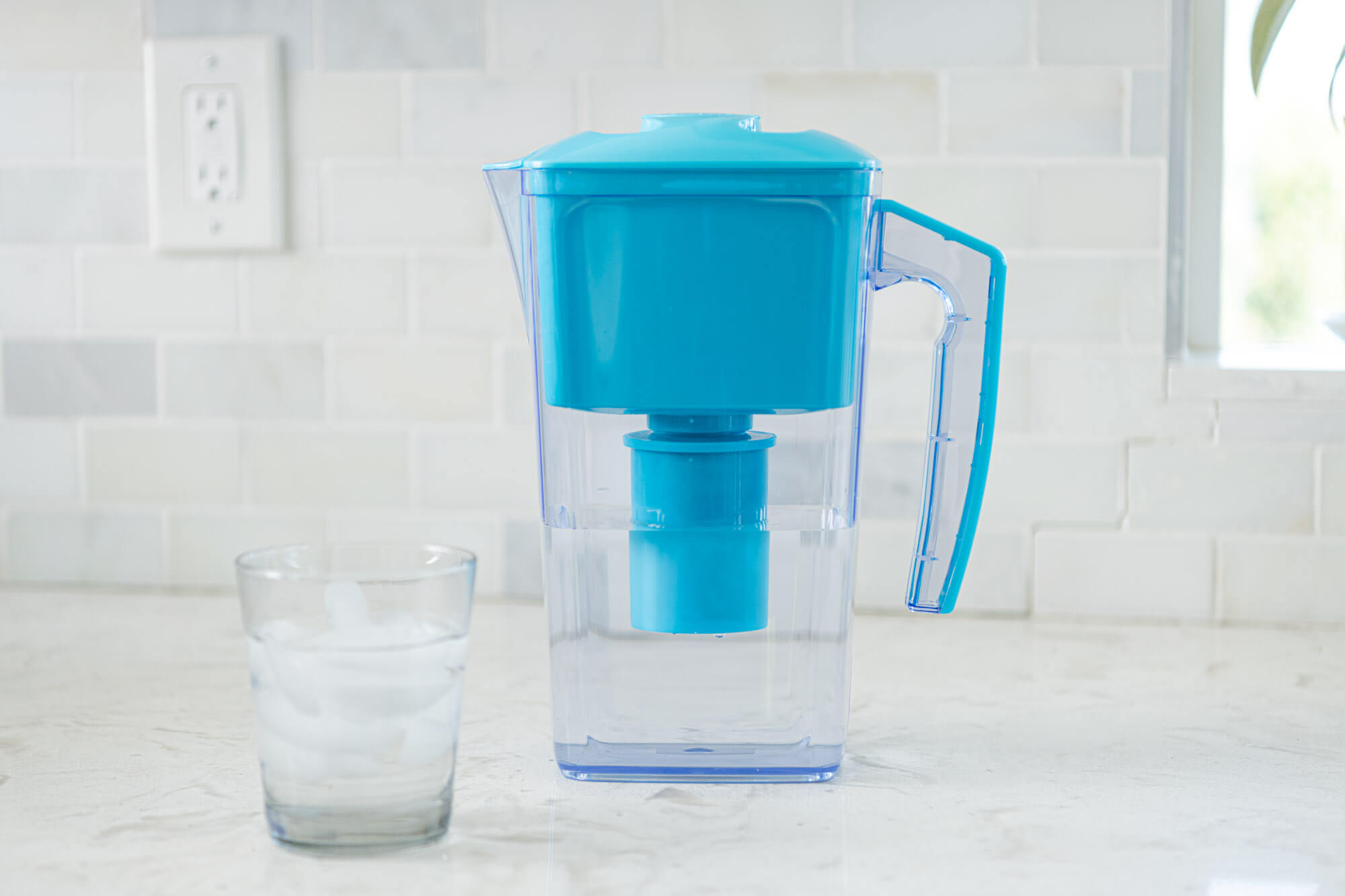
The OXA – Alkaline Water Filter Pitcher is the smallest we found, which means it’s a bit easier to pour from and keep in a refrigerator. That said, it also had the quickest flow-through rate, and as a result the filter made the least difference in our tests. It can still remove chlorine, but it doesn’t even add very much in the way of alkaline minerals.
Are there alkaline water benefits?
We looked for the source of the claims about alkaline water and traced most back to two base claims: the “alkaline diet” hypothesis and a study testing hydration for athletes.
We asked a certified personal trainer, Lucas Enge of Mosaic Health, what he knows about the trend and its traction in the “biohacking” community. He says the alkaline diet and the water fit together closely.
“Drinking alkaline water is founded on the principle that high acidic water consumption is going to cause oxidative stress and potentially cause disease,” Lucas says. “[According to this theory] alkaline water consumption ought to help prevent high acidity. Most advocates of alkaline water would likely (not necessarily) follow an alkaline diet simultaneously.”
Does he think it’s a sound theory? “I’m not convinced alkaline water is the solution,” he says. “Find yourself a high-quality water-filtration system.”
To get a research-based assessment of the alkaline diet claims, we reached out to Dr. Tanis Fenton, a nutritionist who has spent considerable time reviewing research and educating the public about claims made by diet promoters. In 2016 she co-wrote a systematic review of claims about alkaline water and cancer specifically.
Dr. Fenton gave us her findings in simple, unambiguous terms: “We have looked for evidence that the alkaline diet [benefits] bone health, cancer prevention and treatment, weight loss and heart disease and have found no evidence to support that it makes any difference at all.”
She notes that the hypothesis about dietary pH is based on century-old data, and that more recent studies totally disprove the old acid–ash hypothesis. “The body, and specifically the lungs and kidneys, work to maintain a normal blood pH. If something goes wrong with this process: for example, if one has a lung or kidney disease, or they are poisoned, then the body may not be able to maintain the normal blood pH. People who have a blood pH outside of the normal range are very sick and generally need to be hospitalized in an ICU to keep them alive.”
We asked if there could be anyone who would benefit from drinking alkaline water, even in special cases, and she said “No, other than the companies that are using it as a marketing strategy.”
One popular claim about alkaline water is that it can hydrate your body differently than normal purified water. This claim has been tested in one study: In 2016, the Journal of the International Society of Sports Nutrition published “Effect of electrolyzed high-pH alkaline water on blood viscosity in healthy adults.” Dr. Fenton notes that while the study looks at four different markers for the effectiveness of hydration, only one showed a different result with alkaline water, and she calls the validity of this one measurement of hydration “very questionable.”
Dr. Fenton doesn’t deny that you could get good results from switching to an alkaline diet, but that all depends on what you’re eating now. “If someone wants to try the alkaline diet, I would tell them that are some desirable aspects of the diet including the encouragement to eat plenty of vegetables and fruit, to eat less sugar and less processed foods. I would caution them that the alkaline diet promoters sometimes say that protein is not important for health, which is not true.” Do note, drinking alkaline water doesn’t have anything to do with those positive aspects of the alkaline diet.
How we selected finalists to test
When we searched the web for reviews of alkaline water products, we discovered a minefield of hype and vague claims. Top-ranked review pages show little if any testing, and do nothing to temper the enthusiasm of marketing pitches for “vital” and “balanced” water. We didn’t find any reviews that actually include consultation with experts.
The pitchers all use standard approaches to filtering water, with cartridges containing granules of activated carbon. Some also use ion-exchange resin to grab minerals, and some add layers of “KDF” (made from brass shavings) to speed up chlorine reduction. (KDF media is more popular in high-flow dechlorinators like the shower water filters we’ve reviewed.) All are using some form of compressed mineral powder (similar to what’s in an antacid tablet) to boost pH.
Most are also including red “tourmaline” (quartz or possibly hematite) ceramic beads, which manufacturers claim will add “far-IR radiation” (better known simply as “heat energy”) but don’t do anything beneficial for your water. We’ve tested products that use tourmaline ceramic plates to reduce static cling in our hair dryer review and flat iron review, but those products use heat and pressure to release ions from the tourmaline.
Mainstream manufacturers like Brita and PUR all use extensive tests by third-party agencies like NSF international to show off how effective their filters are at removing harmful or taste-altering chemicals. We were surprised at how little information was provided about the filter performance for alkaline water pitchers. Given how effective activated carbon is at removing chlorine, we thought we’d see at least some test results to show that they can deal with easy filtration tasks.
Only one filter pitcher manufacturer from the alkaline crowd, Seychelle Environmental Technologies Inc, provided documentation of testing. The test results are comparable to results from other popular filters, and it was reassuring to see some evidence to back up claims about “improved” water. That said, the documentation doesn’t show clearly which of their products (the line includes three different types of filters) was tested by the labs.
In addition to the one pitcher that offered some filter performance proof, we picked the four best-selling filter pitchers with good customer reviews on Amazon and with good availability of replacement filters at a price comparable to conventional filters.
Important features to consider
Certified filter performance: If you’re depending on a filter to make your water cleaner, and not just trying to improve the taste, it’s important to look for actual certified test results. NSF International provides the most complete testing we’ve seen, running the filter well beyond its rated lifespan to ensure the filter can actually live up to its claims. None of the alkaline water filters we found are actually certified by an agency like NSF, though Seychelle does provide a copy of a lab result for an unspecified filter.
Adjustable flow rate: If you really want to add alkaline minerals to your water, it’s nice to be able to dial in the amount of change by adjusting the flow rate — Slower flow through the mineral layer will increase the amount of dissolved solids.
A sealed-reservoir design: If you want to pour a glass of water right away when you fill up the pitcher, you need a design with a top reservoir that doesn’t allow unfiltered water to leak into your glass.
Space-efficient pitcher size: If you’re chilling your water, you’ll need to figure out what shape of pitcher will fit your refrigerator best. A narrow oval shape will fit better on most shelves, while a tall cylinder might be better for some fridge doors.
Easy-clean design: The minerals added by the filters in these pitchers will eventually lead to build-up in your pitcher, so a design that has fewer nooks and crannies will collect less of that sediment and be easier to clean. Vinegar or any cleaner designed to help with hard-water scale should be effective.
Ionizers vs alkaline minerals: We didn’t test any water ionizers, since they are very expensive to purchase and operate. Ionizers don’t provide the taste benefits of extra minerals, either. Ionizers use electricity to split your water into hydroxide-rich alkaline water and acidic water, but there’s no reason for most people to do this. (You could use an electrolyser with salt and water to make lye and chlorine disinfectants, but it’s an expensive way to do that, too.)
Alkaline vs. conventional filters
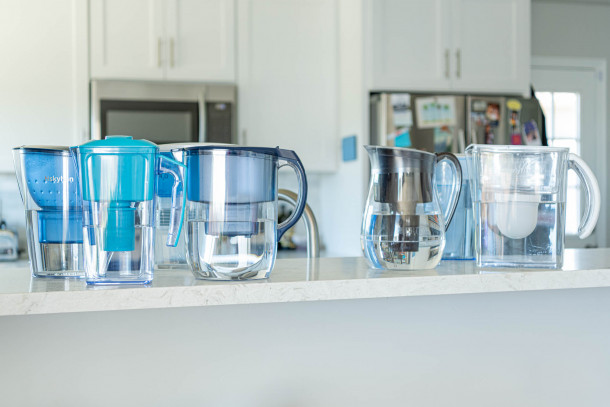
There are a few important differences between the pitchers we recommend in our water filter pitcher review and the pitchers that advertise “alkaline water” as a feature.
First and foremost, the water filter pitchers we recommend are tested by an independent laboratory and independently certified to remove specific contaminants. It used to be that people weren’t especially worried about any one specific contaminant, but the Flint water crisis helped shine a light on the problems caused by lead pipes in older houses. More and more people are now realizing that they have low levels of lead coming out of their taps, even if the water supply is totally lead-free.
Only one of the alkaline-water filters, the Seychelle, has any manufacturer claims about tests for lead removal, but the test results provided have some problems, since they don’t tell us which of Seychelle’s filters was tested and don’t even show the expected added mineral content.
Secondly, availability of filters for these alkaline water pitchers could be unreliable. Brita, ZeroWater and PUR filters can be purchased at local retailers, and you can still use your oldest Brita pitcher with the newest filters.
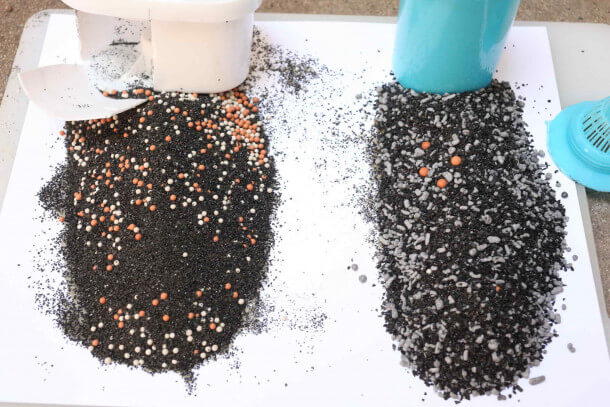
Finally, there’s price. Many alkaline water filters are insanely expensive given what’s inside — granular activated carbon with mineral tablets mixed in. In contrast, the certified-lead-removing Brita – Longlast filters are actually less expensive per gallon than many generic replacements.
How we tested
After using each of these water filters for daily drinking in a household of four, we checked the advertising claims with laboratory equipment in controlled tests.
Changes to pH
We tested a sample of water from each pitcher for pH using a Hanna Instruments HI98103, calibrated immediately before the test and rinsed in cleaning solution between samples.
Results from this test showed that each of the filters was successfully adding some dissolved minerals, but repeated tests showed that the results varied from fill to fill. As predicted, quicker-flowing filters didn’t change pH as much as filters that took a long time. The EHM – Ultra II is the only pitcher that allows you to control this flow rate. In its middle setting, though, the EHM only gave us a slight bump from 7.5 to 7.9; we had to slow it down to a dribble to see a notable bump up to the claimed pH 8–9 range.
If you don’t have a calibrated electronic pH meter, it’s difficult to know what the actual water pH would be, but at least adjustment is possible. You could also use a tester for dissolved solids (which measures the electrolytic properties of added minerals) to calibrate the flow rate, if you’re not worried about hitting a specific pH and you just want the flavor.
The fast-flowing OXA pitcher made barely any difference, but the variability of the rate these minerals will dissolve in your water is one of the biggest problems with this type of filter. Without control over flow rate, you’re relying on the consistency of the mineral clumps or beads to ensure that the pH stays consistent — the manufacturers offer no guarantees.
| Alkaline Water Pitcher | Average pH | Fluoride Removal? | $ Per Gallon | Avgerage Taste Score |
|---|---|---|---|---|
| EHM - Ultra II | 7.9 | 60% | 0.25 | 2/5 |
| Hskyhan | 8.3 | None | 0.21 | 3/5 |
| Seychelle - pH2O Pure | 8.8 | 40% | 0.20 | 2/5 |
| OXA | 7.9 | None | 0.20 | 1/5 |
| Control - Brita Longlast Filter | 7.1 | None | 0.12 | 4/5 |
| Control - ZeroWater Filter | 7.05 | 90% | 0.40 | 4/5 |
| Control - Tap Water | 7.2 | -- | -- | 1/5 |
Chlorine removal
Each of the filters removed the 2 parts-per-million of chlorine added by our local water treatment facility, down to a level that wasn’t detectable with a Hatch CN-66T test kit. This isn’t a surprising result, since even a well-used generic carbon filter can remove chlorine.
Fluoride removal
Sodium fluoride is a difficult mineral to remove from water. Typically, slow-acting activated alumina filters are used if you need to remove fluoride, unless it makes sense to use more expensive systems to get completely pure water. The only pitcher-based system we’ve tested thus far that’s effective at fluoride removal is the ZeroWater ion-exchange system.
We tested each filter with a 4 parts-per-million (ppm) fluoride challenge solution, and we only saw a final reading below 1 ppm with one filter – the EHM. Ironically, this is one of the pitchers that did not claim any effectiveness at removing fluoride. Our tester speculates that the result is because of a chemical reaction between the indicator chemical or the fluoride and the alkaline minerals, rather than the presence of some component in the filter successfully removing fluoride.
Taste
Testers in our test group had strong reactions to the minerals in the samples. Some thought they tasted better than chlorinated tap water, but all prefered water from a Brita pitcher, and in this test group the ZeroWater pitcher won the most votes with its tangy zero-mineral taste.
The alkaline water got adjectives like “silty,” “musty,” “sandy” and “dirty.” When we tried making coffee and tea with the alkaline water, some testers liked the taste, but not most.
The bottom line
Put simply, alkaline water is a marketing ploy used to get people to buy devices or bottled water that they don’t need at a premium price. If you like the taste of the minerals these filters add, they probably won’t hurt you, but the complete lack of information provided by the manufacturers should give you pause.
While the EHM – Ultra II pitcher has more going for it than the others, you still shouldn’t buy it for any reason other than to add a mystery mix of minerals to your water because you like how that tastes. There’s likely to be as much harmful as helpful in the rocks that EHM puts in the filter, but not enough either way to make any difference.
In our review of the best water filter pitchers, we picked the Brita – Longlast series as best overall, since it’s certified to remove lead, and the filter lasts for about six months of daily use. If you’re looking for a new water filter pitcher, that’s our first choice, though some of our taste-test participants like the no-mineral flavor of ZeroWater better.
More Reviews
Bauerfeind
Lululemon - Energy
Feetures - Elite Max Cushion
Patagonia - Strider Pro
ZFOsports
SPRI - High Density Roller
No Cry Cordless
Pado - PureWave - CM-07
The Best Soaps for Sensitive Skin
CeraVe - Hydrating Body Wash
The Best Protein Powders for Women
Muscle Feast - Whey Isolate
Healthy Paws
PureWave - CM7


